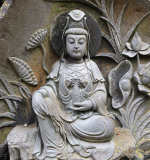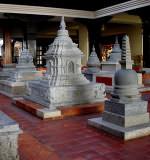| Baixe e instale a(s) fonte(s) indispensável(is) para ver o sânscrito em toda a sua glória Leia Transliterando (2) (português) para entender completamente o sistema de transliteração. |
Bodhapañcadaśikā (Bodhapancadashika)
Quinze estrofes sobre Conhecimento/Consciência
Introduction
This is venerable Abhinavagupta's Bodhapañcadaśikā (Fifteen stanzas about Knowledge/Consciousness). Abhinavagupta is very well known for his voluminous works such as Tantrāloka, Tantrasāra, Parātrīśikāvivaraṇa, etc. All those works require a high IQ and a lot of experience and knowledge about the Trika Shaivism tradition. The disciples of Abhinavagupta not always had capable intellects which could grasp the meanings in all of his mysterious teachings. Many of them were just devotees, with a great heart but with little intellectual skills as to cope with such extensive treatises full of complex Sanskrit. It is generally said that only sublime Kṣemarāja could deal with massive Abhinavagupta's scholarship. So, in order to alleviate those disciples endowed with weak intellects, compassionately, Abhinavagupta composed this work consisting of 16 stanzas (15 stanzas with teachings + 1 final stanza closing the brief scripture). In it Abhinavagupta gave the gist of his teachings as well as the gist of Trika Shaivism as a whole.
Now read Bodhapañcadaśikā and experience Supreme Delight, dear Śiva.
Important: All that is in brackets and italicized within the translation has been added by me in order to complete the sense of a particular phrase or sentence. In turn, all that is between double hyphen (--...--) constitutes clarifying further information also added by me.
Bodhapañcadaśikā
श्रीबोधपञ्चदशिका
अनस्तमितभारूपस्तेजसां तमसामपि।
य एकोऽन्तर्यदन्तश्च तेजांसि च तमांसि च॥१॥
स एव सर्वभूतानां स्वभावः परमेश्वरः।
भावजातं हि तस्यैव शक्तिरीश्वरतामयी॥२॥
शक्तिश्च शक्तिमद्रूपाद्व्यतिरेकं न वाञ्च्छति।
तादात्म्यमनयोर्नित्यं वह्निदाहिकयोरिव॥३॥
स एव भैरवो देवो जगद्भरणलक्षणः।
स्वात्मादर्शे समग्रं हि यच्छक्त्या प्रतिबिम्बितम्॥४॥
तस्यैवैषा परा देवी स्वरूपामर्शनोत्सुका।
पूर्णत्वं सर्वभावेषु यस्या नाल्पं नचाधिकम्॥५॥
एष देवोऽनया देव्या नित्यं क्रीडारसोत्सुकः।
विचित्रान्सृष्टिसंहारान्विधत्ते युगपद्विभुः॥६॥
अतिदुर्घटकारित्वमस्यानुत्तरमेव यत्।
एतदेव स्वतन्त्रत्वमैश्वर्यं बोधरूपता॥७॥
परिच्छिन्नप्रकासत्वं जडस्य किल लक्षणम्।
जडाद्विलक्षणो बोधो यतो न परिमीयते॥८॥
एवमस्य स्वतन्त्रस्य निजशक्त्युपभेदिनः।
स्वात्मगाः सृष्टिसंहाराः स्वरूपत्वेन संस्थिताः॥९॥
तेषु वैचित्र्यमत्यन्तमूर्ध्वाधस्तिर्यगेव यत्।
भुवनानि तदंशाश्च सुखदुःखमतिश्च या [सुखदुःखमतिर्भवः]॥१०॥
यदेतस्यापरिज्ञानं तत्स्वातन्त्र्यं हि वर्णितम्।
स एव खलु संसारो मूढानां यो विभीषकः॥११॥
तत्प्रसादरसादेव गुर्वागमत एव वा।
शास्त्राद्वा परमेशस्य यस्मात्कस्मादुपागतम्॥१२॥
यत्तत्त्वस्य परिज्ञानं स मोक्षः परमेशता।
तत्पूर्णत्वं प्रबुद्धानां जीवन्मुक्तिश्च सा स्मृता॥१३॥
एतौ बन्धविमोक्षौ च परमेशस्वरूपतः।
न भिद्येते न भेदो हि तत्त्वतः परमेश्वरे॥१४॥
इत्थमिच्छाकलाज्ञानशक्तिशूलाम्बुजाश्रितः।
भैरवः सर्वभावानां स्वभावः परिशील्यते॥१५॥
सुकुमारमतीञ्शिष्यान्प्रबोधयितुमञ्जसा।
इमेऽभिनवगुप्तेन श्लोकाः पञ्चदशोदिताः॥।१६॥
Śrībodhapañcadaśikā
Anastamitabhārūpastejasāṁ tamasāmapi|
Ya eko'ntaryadantaśca tejāṁsi ca tamāṁsi ca||1||
Sa eva sarvabhūtānāṁ svabhāvaḥ parameśvaraḥ|
Bhāvajātaṁ hi tasyaiva śaktirīśvaratāmayī||2||
Śaktiśca śaktimadrūpādvyatirekaṁ na vāñcchati|
Tādātmyamanayornityaṁ vahnidāhikayoriva||3||
Sa eva bhairavo devo jagadbharaṇalakṣaṇaḥ|
Svātmādarśe samagraṁ hi yacchaktyā pratibimbitam||4||
Tasyaivaiṣā parā devī svarūpāmarśanotsukā|
Pūrṇatvaṁ sarvabhāveṣu yasyā nālpaṁ nacādhikam||5||
Eṣa devo'nayā devyā nityaṁ krīḍārasotsukaḥ|
Vicitrānsṛṣṭisaṁhārānvidhatte yugapadvibhuḥ||6||
Atidurghaṭakāritvamasyānuttarameva yat|
Etadeva svatantratvamaiśvaryaṁ bodharūpatā||7||
Paricchinnaprakāsatvaṁ jaḍasya kila lakṣaṇam|
Jaḍādvilakṣaṇo bodho yato na parimīyate||8||
Evamasya svatantrasya nijaśaktyupabhedinaḥ|
Svātmagāḥ sṛṣṭisaṁhārāḥ svarūpatvena saṁsthitāḥ||9||
Teṣu vaicitryamatyantamūrdhvādhastiryageva yat|
Bhuvanāni tadaṁśāśca sukhaduḥkhamatiśca yā [sukhaduḥkhamatirbhavaḥ]||10||
Yadetasyāparijñānaṁ tatsvātantryaṁ hi varṇitam|
Sa eva khalu saṁsāro mūḍhānāṁ yo vibhīṣakaḥ||11||
Tatprasādarasādeva gurvāgamata eva vā|
Śāstrādvā parameśasya yasmātkasmādupāgatam||12||
Yattattvasya parijñānaṁ sa mokṣaḥ parameśatā|
Tatpūrṇatvaṁ prabuddhānāṁ jīvanmuktiśca sā smṛtā||13||
Etau bandhavimokṣau ca parameśasvarūpataḥ|
Na bhidyete na bhedo hi tattvataḥ parameśvare||14||
Itthamicchākalājñānaśaktiśūlāmbujāśritaḥ|
Bhairavaḥ sarvabhāvānāṁ svabhāvaḥ pariśīlyate||15||
Sukumāramatīñśiṣyānprabodhayitumañjasā|
Ime'bhinavaguptena ślokāḥ pañcadaśoditāḥ|||16||
Venerable fifteen stanzas about Knowledge/Consciousness (śrī-bodha-pañcadaśikā)
Among (all kinds of) light (tejasām) (and) even (api) darkness (tamasām), the Light of Consciousness, that is one and internal, is not subject to setting or declining (anastamita-bhārūpaḥ... yaḥ ekaḥ antar), and (ca) within It (yad-antar) (do reside all those types of) light (tejāṁsi) and (ca... ca) darkness (tamāṁsi)||1||
The Supreme Lord (saḥ eva... parama-īśvaraḥ) (is) the essential nature (sva-bhāvaḥ) of all the beings (sarva-bhūtānām). The multitude of objects (bhāva-jātam hi) (is) His (tasya eva) Śakti or Power (śaktiḥ), which has Supremacy (īśvaratā-mayī)||2||
And (ca) Śakti (śaktiḥ) does not (na) assumes (vāñcchati) separation (vyatirekam) from the Possessor of Śakti --viz. from Śiva, the Supreme Lord-- (śaktimat-rūpāt). Identity or unity (tādātmyam) of Them both (anayoḥ) (is) eternal (nityam) as (iva) (the one) between fire and the quality of burning (vahni-dāhikayoḥ)||3||
He (saḥ eva), God (devaḥ) Bhairava (bhairavaḥ), (is) characterized by being the Holder of the universe (jagat-bharaṇa-lakṣaṇaḥ). By means of His Power --i.e. of His Svātantryaśakti or Power of Absolute Freedom-- (yad-śaktyā), everything --viz. the whole universe consisting of a multitude of objects-- (samagram) (is) undoubtedly (hi) reflected (pratibimbitam) in the Mirror of His own Self (sva-ātma-ādarśe)||4||
This (eṣā) Supreme (parā) Goddess (devī) of His --of Śiva or Bhairava-- (tasya eva) is fond of getting in touch with (His) own essential nature (svarūpa-āmarśana-utsukā). Her (yasyāḥ) Fullness (pūrṇatvam) in all the objects (sarva-bhāveṣu) (is) neither (na) (too) little (alpam) nor (na ca) (too) abundant (adhikam)||5||
This (eṣaḥ) all-pervading (vibhuḥ) God (devaḥ) —along with this Goddess (anayā devyā)—, who is always fond of desiring to play (nityam krīḍā-rasa-utsukaḥ), creates (vidhatte) simultaneously (yugapad) multiple processes of manifestation and withdrawal (of the universe) (vicitrān sṛṣṭi-saṁhārān)||6||
This (etad eva) Doership of what is very difficult to be accomplished (ati-durghaṭa-kāritvam) belonging to Him (asya) —which --i.e. such a Doership-- (yad) (is) Supreme --i.e. no other being in this universe can carry it out-- (anuttaram eva)— (is His) Absolute Freedom (svatantratvam), viz. (His) Supremacy (aiśvaryam) whose nature is (Sublime) Intelligence (bodha-rūpatā)||7||
The characteristic (lakṣaṇam) of the limited state of being --lit. of what is inert-- (jaḍasya kila) (is) the state of restricted manifestation --e.g. someone is living here but he cannot live in a remote place at the same time-- (paricchinna-prakāsatvam). (However,) Consciousness (bodhaḥ) differs (vilakṣaṇaḥ) from the limited state of being (jaḍāt). (Why?) Because (yatas) It cannot be measured --i.e. It is not restricted to one place like in the case of that which is inert-- (na parimīyate)||8||
Thus (evam), the manifestations and withdrawals (sṛṣṭi-saṁhārāḥ) of this Free One --i.e. Bhairava-- who creates subdivisions by means of His own Power (asya svatantrasya nija-śakti-upabhedinaḥ) exist in His own Self --viz. in the sphere of Knowledge-- (sva-ātma-gāḥ) (and also) exist (saṁsthitāḥ) in their own condition --viz. in the sphere of ignorance-- (sva-rūpatvena)||9||
The excessive (atyantam) variety (vaicitryam) in those (manifestations and withdrawals) (teṣu), which --i.e. such an excessive variety-- (yad) (is) up, down (or even) sideways (ūrdhva-adhas-tiryak eva), (consists of) worlds (bhuvanāni) and (ca) portions of that --i.e. of worlds-- (tad-aṁśāḥ), as well as (ca) (of) pleasure, pain and intellectual power (sukha-duḥkha-matiḥ... yā) [(another reading would be like this:) (of) pleasure, pain and intellectual power (sukha-duḥkha-matiḥ); (this is) Saṁsāra or transmigration replete with misery (bhavaḥ)]||10||
That (tad) which (yad) (is) non-perception (aparijñānam) of this (etasya) --i.e. non-perception that all the worlds, portions of worlds, etc. are inside the Supreme Principle and that there is consequently no time-- (is) also described (varṇitam) as (His) Svātantrya or Absolute Freedom (svātantryam hi). (So,) that very (non-perception of Reality) (saḥ eva) (is) certainly (khalu) Saṁsāra or transmigration full of suffering (saṁsāraḥ), which (yaḥ) terrifies (vibhīṣakaḥ) the ignorant --lit. the ones who are bewildered-- (mūḍhānām)||11||
“(But when) through the Nectar of His Favor (tad-prasāda-rasāt eva), or (vā) through all that comes from the Guru (guru-āgamataḥ eva), or (vā) through the (Bhairava’s) scriptures (śāstrāt), (or) through anything whatsoever (yasmāt kasmāt) coming (upāgatam) from the Supreme Lord (parama-īśasya), (there is) perception --i.e. realization-- (parijñānam) of that Truth --viz. that all the worlds, portions of worlds, etc. remain in Bhairava alone and that there is no time at all-- (yad-tattvasya), (then that is) Liberation (saḥ mokṣaḥ) —viz. the State of the Supreme Lord (parama-īśatā)—. (And) that (tad) (is) Fullness (pūrṇatvam) of the ones who are awakened (to their own Self) (prabuddhānām). And (ca) (that) is (also) called (sā smṛtā) Liberation while living (jīvat-muktiḥ)||12-13||
These (etau) bondage and Liberation (bandha-vimokṣau) are not different (na bhidyete) from the essential nature of the Supreme Lord (parama-īśa-svarūpataḥ) because (hi) no differentiation --i.e. duality-- (na bhedaḥ) (has) really (arisen) (tattvatas) in the Supreme Lord (parama-īśvare)||14||
In this way (ittham), Bhairava (bhairavaḥ), in whom dwells, on the (triple) lotus, the trident of Powers (constituted by) Will, Action and Knowledge (icchā-kalā-jñāna-śakti-śūla-ambuja-āśritaḥ), is to be contemplated (pariśīlyate) as being the essential nature (sva-bhāvaḥ) of all that exists --the whole 118 worlds and all that is inside them-- (sarva-bhāvānām)||15||
These (ime) fifteen (pañcadaśa) stanzas (ślokāḥ) have been spoken (uditāḥ) by Abhinavagupta (abhinavaguptena) to instantaneously awaken (prabodhayitum añjasā) disciples with very little intellectual power --lit. disciples with very tender intelligence, i.e. disciples who have received weak Śaktipāta (Grace’s bestowal)-- (su-kumāra-matīn śiṣyān... iti)||16||
Without a global explanation yet
Informação adicional
Este documento foi concebido por Gabriel Pradīpaka, um dos dois fundadores deste site, e guru espiritual versado em idioma Sânscrito e filosofia Trika.
Para maior informação sobre Sânscrito, Yoga e Filosofia Indiana; ou se você quiser fazer um comentário, perguntar algo ou corrigir algum erro, sinta-se à vontade para enviar um e-mail: Este é nosso endereço de e-mail.





























